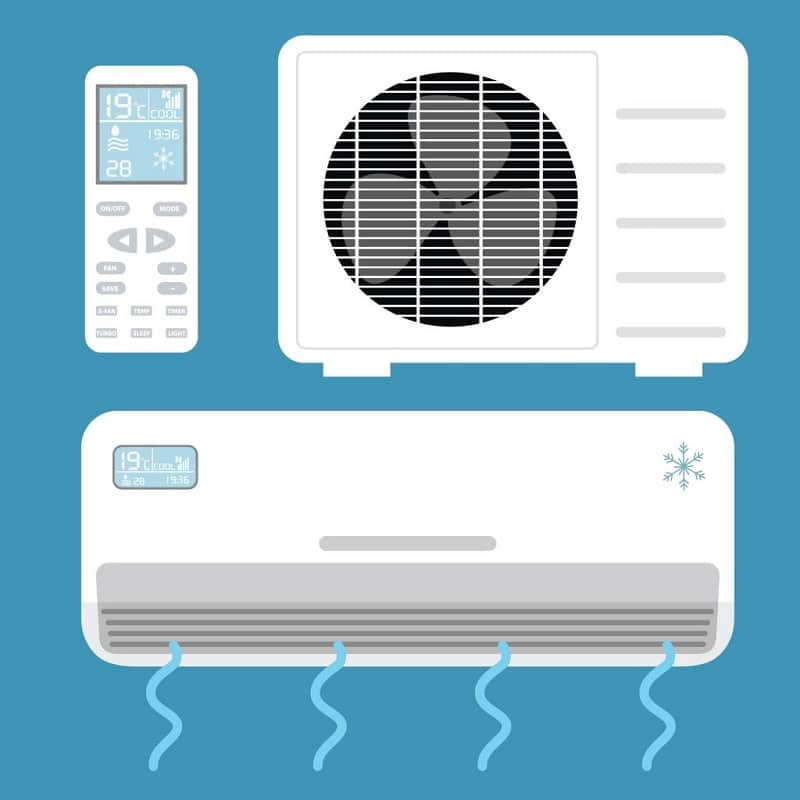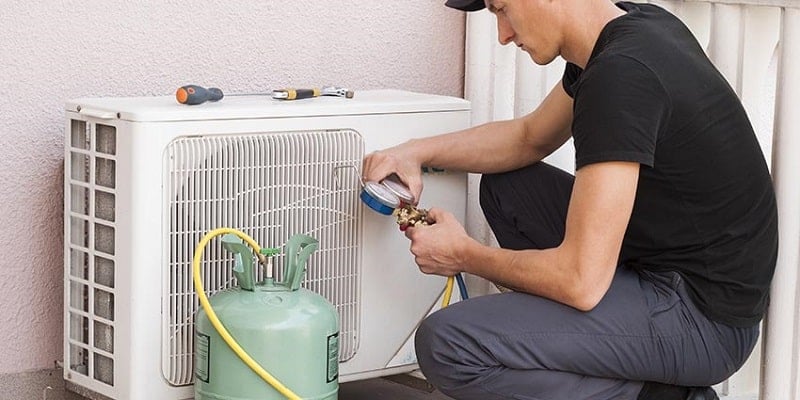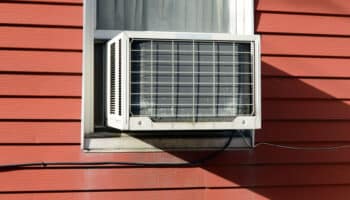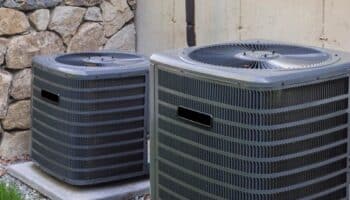We've independently reviewed this article to make sure it's as accurate as we can make it.
To find out more about our article creation and review process, check out our editorial guidelines.
If your air conditioner is making unusual sounds, it’s natural to be concerned.
In fact, just like your car, any new sounds demand to be looked into. Air conditioners are naturally noisy things, but a few sounds need special attention.
The good news is that a hissing sound from an air conditioner is NOT likely to be a refrigerant leak.
A leaking refrigerant is typically from a tiny puncture, and can’t typically be heard without special equipment. If the leak was loud enough to audibly hear, the AC would stop working altogether within a couple hours.
With that said, there are reasons you may hear hissing from your air conditioner – and it can be reassuring to know the cause of each one. So if you’d like to know more, then let’s dive in!
Why Your Air Conditioning Is Hissing
A hissing sound from your AC generally isn’t a sign of a more serious condition like a refrigerant leak. If you can only hear the hissing sound from your vents when the air conditioner is active, the sound is probably coming from your ductwork. This isn’t a big problem, and it shouldn’t get worse. The only reason you would want to look into fixing this issue is if it irritates you.
If the sound is coming from your AC unit after you switch it off, this could be the freon equalizing. As the refrigerant balances back out to the natural temperature (instead of being heated and cooled by the unit), it may make some noise as it passes through the system.
Is an Air Conditioner Leak Dangerous?
If you do think you have a refrigerant leak, there’s no need to panic. While the leaking refrigerant is a hazard to both your health and the environment, small amounts found in typical residential units won’t harm you.
However, refrigerants are toxic enough that it’s illegal to perform repairs on these appliances without certification. Even though the leak probably won’t affect you unless you try to repair it yourself, here are the symptoms to watch out for:
- Unusual headaches
- Nausea
- Vomiting
- Coughing
- Lightheadedness
- Other eye, mouth, or throat issues
If you notice an uptick in these problems at the same time as an air conditioner leak, ventilate your property thoroughly. Stay away until you can get your air conditioner fixed. There is currently no approved drug to treat refrigerant poisoning.
Although the health effects of refrigerant are unlikely to affect you, the risk to your air conditioner itself is much more significant.
At first, a leak simply lowers your air conditioner’s efficiency. Left unchecked, the problem increases as the gas flows out. Over time, your air conditioner will have to work harder and longer to have the same effect. Meanwhile, parts of it will get too cold even as your house stays warm. This will strain the machine, especially the expensive compressor.
Catching a leak early can be the difference between a few hundred dollar repair and a new AC unit.
Can You Smell Freon From An Air Conditioner?
Unlike many of the gasses we use in our households, Freon is almost odorless, as are other brands of refrigerant. This doesn’t mean there aren’t other ways to tell if there’s a leak. Other than hearing a hiss, here are four ways to identify a refrigerant leak:
- Your air conditioned air isn’t cold:
- There’s ice on your refrigerant line: If your outdoor AC unit has ice building up on the copper refrigerant line, that’s an immediate sign something’s wrong. Especially in a hot summer, ice shouldn’t form on your AC. Turn it off immediately or you risk (further) damage. (Water dripping from the unit can be caused by this ice, but it could be also be due to a leak.)
- High electrical bills: Sometimes a leaking air conditioner can still get the job done by running overtime. Not only does this put extra stress on the unit, but it spikes your electricity usage. As more refrigerant leaks, the problem will only get worse. Pay attention to how long your air conditioner is running to cool down your house.
When To Call A Professional
A refrigerant leak worsens your air conditioner and risks your health. However, the fear of an expensive repair might discourage a call to a technician.
Don’t worry!
The sooner you make the call, the cheaper this kind of repair can be. Although an unchecked leak can cost even $1000, calling a professional as soon as it’s detected can slash that number down to under $250, depending on the scale of the issue. Refrigerants are very expensive, and the less that leaks out, the better off you are.
Do not try home repair. Not only is this illegal, but without the proper training and equipment, it is unlikely you will successfully find and patch the leak. It’s not a bicycle tire! Not only that, but only a professional can refill the lost refrigerant.
When choosing a technician, be sure to visit the Better Business Bureau to make sure they are well-rated. Although most companies pride themselves on good service, some just want a quick buck. One common scam is to simply refill the refrigerant without repairing the leak. This guarantees them future business, because you’ll keep needing those expensive refills. Never hire a technician to refill your refrigerant without having a full examination for a leak. It’s bad for your health, for the environment, and for honest companies.
Another scam for refrigerant repair is that they claim they added more refrigerant than the system holds! Most AC systems have a tag that lists the amount of refrigerant in the system, so you can make sure they’re being honest.
Preventing Air Conditioner Leaks
Most air conditioner leaks come from the same source as so many other problems: neglect. Even though air conditioners are hardy machines that can take care of themselves most of the time, an annual checkup is necessary to maintain health. These are usually done in spring before the AC’s busy summer kicks off.
Many companies offer comprehensive maintenance packages. These should provide filter changes, calibrate the thermostat, and keep your coils in tip-top shape. By checking refrigerant levels, they can catch leaks before hissing even starts, resulting in even bigger savings! If you’re a real do-it-yourselfer, though, this part of AC ownership can be done yourself. If you find any major problems, though, call the professionals.
Conclusion
A hissing sound from your air conditioner doesn’t have to be the end of the world. Although it’s probably a leak that needs repair, it shouldn’t pose a major health risk.
If this content’s helped you, please consider checking out some of our related articles below.










